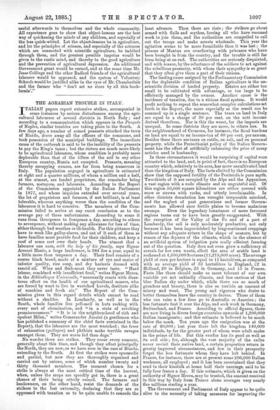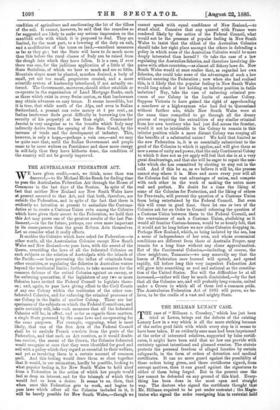THE AGRARIAN TROUBLE IN ITALY.
ITALIAN papers report extensive strikes, accompanied in some instances by serious disturbances among the agri- cultural labourers of several districts in North Italy ; and according to a communication which appears in the Pungolo of Naples, similar troubles are taking place in the South. A few days ago, a number of armed peasants attacked the town
of Riardo, drove away all the officers of the commune, and took possession of the municipal buildings. The immediate cause of the outbreak is said to be the inability of the peasants to pay the King's taxes ; but the rioters are much more likely to be agricultural labourers, whose condition is probably more deplorable than that of the tillers of the soil in any other European country, Russia not excepted. Peasants, meaning thereby occupying owners, are far from being numerous in Italy. The population engaged in agriculture is estimated at eight and a quarter millions, of whom a million and a half, at the utmost, are landed proprietors, the remainder being farmers, metayers, and labourers. According to the Report of the Commission appointed by the Italian Parliament in 1877, and whose inquiries extended over several years, the lot of proprietors and farmers, if not brilliant, is at least tolerable, whereas anything worse than the condition of the labourers it is hard to conceive. The members of the Com- mission failed to arrive at any exact conclusion as to the average pay of these unfortunates. According to some it runs from threepence to fourpence a day, according to others to sevenpence, without making any allowance for loss of time, either through bad weather or ill-health. For this pittance they have to work like galley-slaves, and out of it such of them as have families must provide food for their children, and keep a roof of some sort over their heads. The utmost that a labourer can earn, with the help of his family, says Signor Arcozzi Mani°, a large landowner, is 384 lire a year, equal to a little more than tenpence a day. Their food consists of a coarse black bread, made of a mixture of rye and maize of inferior quality, rice soup, and dry haricots dressed with rancid oil. Wine and flesh-meat they never taste. " Hard labour, combined with insufficient food," writes Signor Mereu, in the Bibliot4gve Universelle," necessarily reacts with disas- trous effect on the health of our agricultural masses, who are forced by want to live in wretched hovels, destitute alike of sunshine and fresh air." The Report of the Com- mission gives in this regard details which cannot be read without a shudder. In Lombardy, as well as in the South, whole families live pell-mell in huts reeking with every sort of abomination, and " in a state of revolting promiscuousness." " It is in the neighbourhood of rich and opulent Milan," writes Commander Jancini (a gentleman who has published a summary of the chief facts contained in the Report), that the labourers are the most wretched ; the fever of exhaustion (pellagra) and phthisis make terrible ravages amongst them. They are worse fed than dogs."
No wonder there are strikes. They occur every summer, generally about this time, and though they affect principally the North, they are now, as we have seen in the case of Riardo, extending to the South. At first the strikes were spasmodic and partial, but now they are thoroughly organised and carried out by unions, some of which number twenty and thirty thousand members. The moment chosen for a strike is always at the most critical time of the harvest, when, unless the crops are speedily got in, there is a great chance of their being utterly ruined. The farmers and landowners, on the other hand, resist the demands of the strikers to the last extremity, declaring that they are so oppressed with taxation as to be quite unable to concede the least advance. Then there are riots ; the strikers go about armed with flails and scythes, forcing all who have resumed work to join them, and the authorities are compelled to call out the troops and make arrests wholesale. This year the agitation seems to be more formidable than it was last ; the prisons of Mantua are overflowing with prisoners who have been brought in from the country, and the trouble is still far from being at an end. The authorities are seriously disquieted,. and with reason, by the reluctance of the soldiers to act against the rebellious peasantry, with whom their sympathy is so great that they often give them a part of their rations.
The leading cause assigned by the Parliamentary Commission for the deplorable condition of Italian agriculture is the un- scientific division of landed property. Estates are either too small to be cultivated with advantage, or too large to be- efficiently managed by the owners. Another cause is the- incidence of taxation, due to a vicious fiscal system. It would profit nothing to repeat the somewhat complex calculations set forth in the Report, the more especially as the result can be summed up in a single sentence. The taxes on land in Italy are equal to a charge of 30 per cent. on the nett income derived therefrom. Nor is this the worst, for the imposts are unequal. In some districts they are more, in others less. In the neighbourhood of Cremona, for instance, the fiscal burdens on land are equal to an income-tax of 60 per cent. per annum. Besides these there are taxes on cattle, on salt, and on personal property, while the Protectionist policy of the Italian Govern- ment has the effect of artificially enhancing the price of many articles used in husbandry.
In these circumstances it would be surprising if capital were attracted to the land, and, in point of fact, there is no European country which, relatively to its area, has more uncultivated land than the kingdom of Italy; The facts elicited by the Commission show that the supposed fertility of the Peninsula is pure myth. Two-thirds of it are occupied by the Alps and the Appenines, a vast region with a rude climate and an ungrateful soil. Of this region 56,000 square kilometres are either covered with snow or strewn with rocks, and utterly irreclaimable. In other districts denudation has wrought irreparable mischief, and the neglect of past generations and former Govern- ments has allowed once fertile plains to become malarious swamps. Even the legendary luxuriance of more favoured regions turns out to have been greatly exaggerated. With the exception of the Valley of the Po and of a part of Lombardy, the soil is only moderately productive, not only because it has been impoverished by long-continued croppings without any adequate return in the shape of manure, but by reason of the dryness of the climate, which in the absence of an artificial system of irrigation puts really efficient farming out of the question. Italy does not even grow a sufficiency of cereals for her own wants, albeit the area of arable land is reckoned at 4,500,000 hectares (11,215,000 acres). The average yield of corn per hectare is equal to 11 hectolitres, as compared.
with an average yield of 33 hectolitres in England, 22 in Holland, 20 in Belgium, 23 in Germany, and 15 in France.
Facts like these should make us more tolerant of our own variable yet not unkindly climate, and less envious of that blue Italian sky under which, while there are so much of grandeur and beauty, there is also so terrible an amount of misery and want. The young and vigorous who desire to batter themselves leave the country in droves. Those of them who can raise a few liras go to Australia or America ; the less fortunate foot it over the Alps, and seek work in Germany, Switzerland, and France. According to official figures, there
are now living in divers foreign countries upwards of 1,200,00.0
Italian immigrants ; and this estimate is believed to be much below the mark. Ten years ago the emigration was at the rate of 40,000; last year there left the kingdom 140,000 individuals, by far the greater part of whom were adult males in the prime of life. But this exodus has its good as well as its evil side ; for, although the vast majority of the exiles never revisit their native land, a certain proportion return in
greatly improved circumstances, and few in their prosperity forget the less fortunate whom they have left behind. In
France, for instance, there are at present some 200,000 Italian workmen, all employed ; and it has been ascertained that they send to their kinsfolk at home half their earnings, said to be fully four francs a day. If this estimate, which is given on the authority of Signor Mereu, may be trusted, the amount received in this way by Italy from France alone averages very nearly five millions sterling a year.
The Government and Parliament of Italy appear to be quite alive to the necessity of taking measures for improving the condition of agriculture and ameliorating the lot of the tillers of the soil. It cannot, however, be said that the remedies so far suggested are likely to make any serious impression on the manifold evils with which it is proposed to deal. They are limited, for the most part, to a lowering of the duty on salt, and a modification of the taxes on land,—excellent measures as far as they go ; but the State will have to do much more than this before the rural classes of Italy can be raised from the slough into which they have fallen. It is a case, if ever there was one, for the judicious application of a little of the State Socialism, of which we hear so much and see so little. Mountain slopes must be planted, marshes drained, a body of small, yet not too small, proprietors created, and a more scientific system of husbandry introduced, if not actually en- forced. The Government, moreover, should either establish or co-operate in the organisation of Land Mortgage Banks, such as those which exist in every Swiss canton, so that landowners may obtain advances on easy terms. It seems incredible, but it is true, that while north of the Alps, and even in Italian Switzerland, a peasant can raise money at 4 per cent., an Italian landowner finds great difficulty in borrowing (on the security of his property) at less than eight. Commander Jancini is very sanguine as to the benefits which Italy may indirectly derive from the opening of the Suez Canal, by the increase of trade and the development of industry. This, however, is only a hope,—perhaps a vain one,—and we may be quite sure that, until the Italian Government and people cease to be mere waiters on Providence and show more energy in sell-help than they have hitherto done, the condition of the country will not be greatly improved.



































 Previous page
Previous page